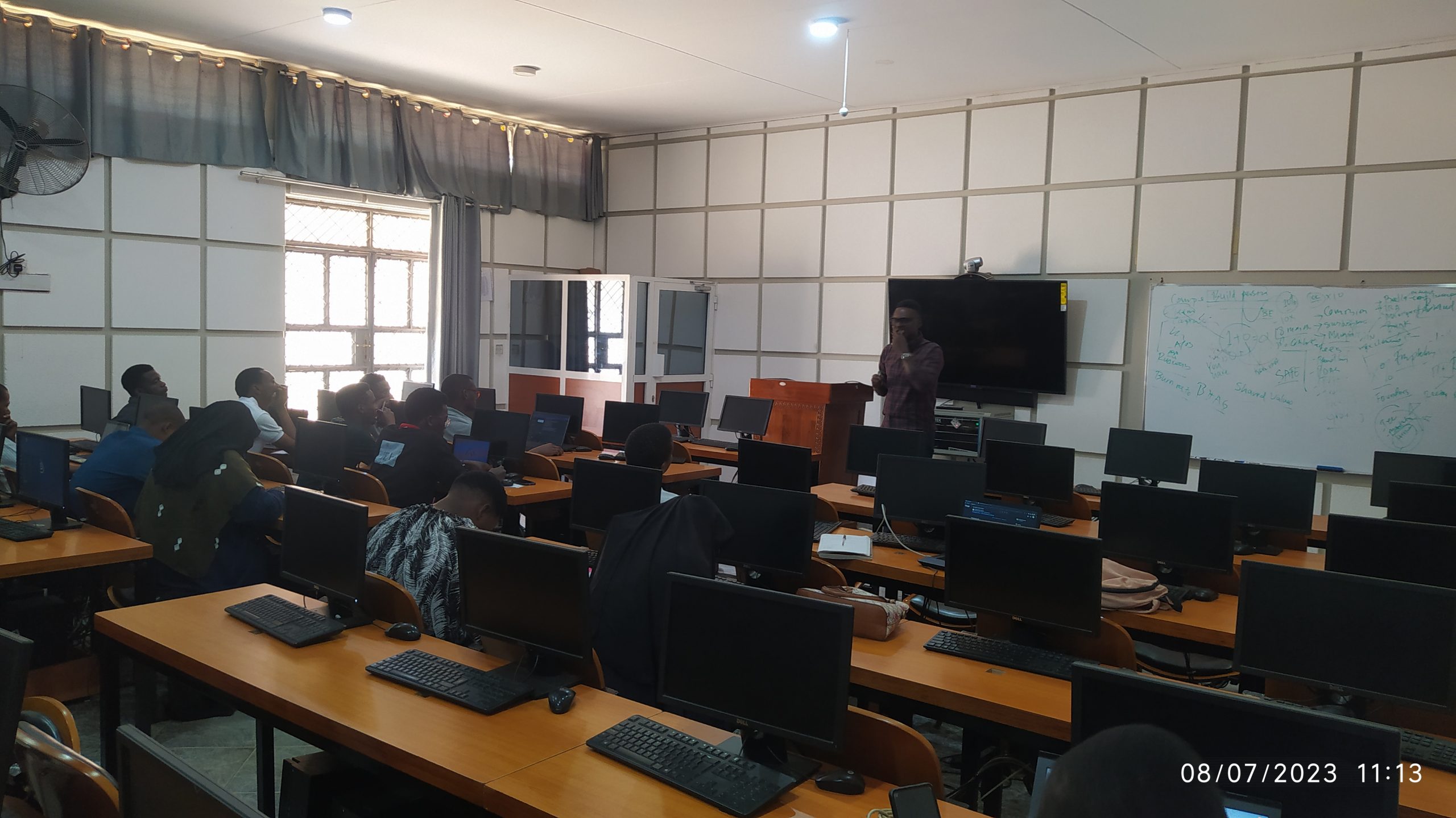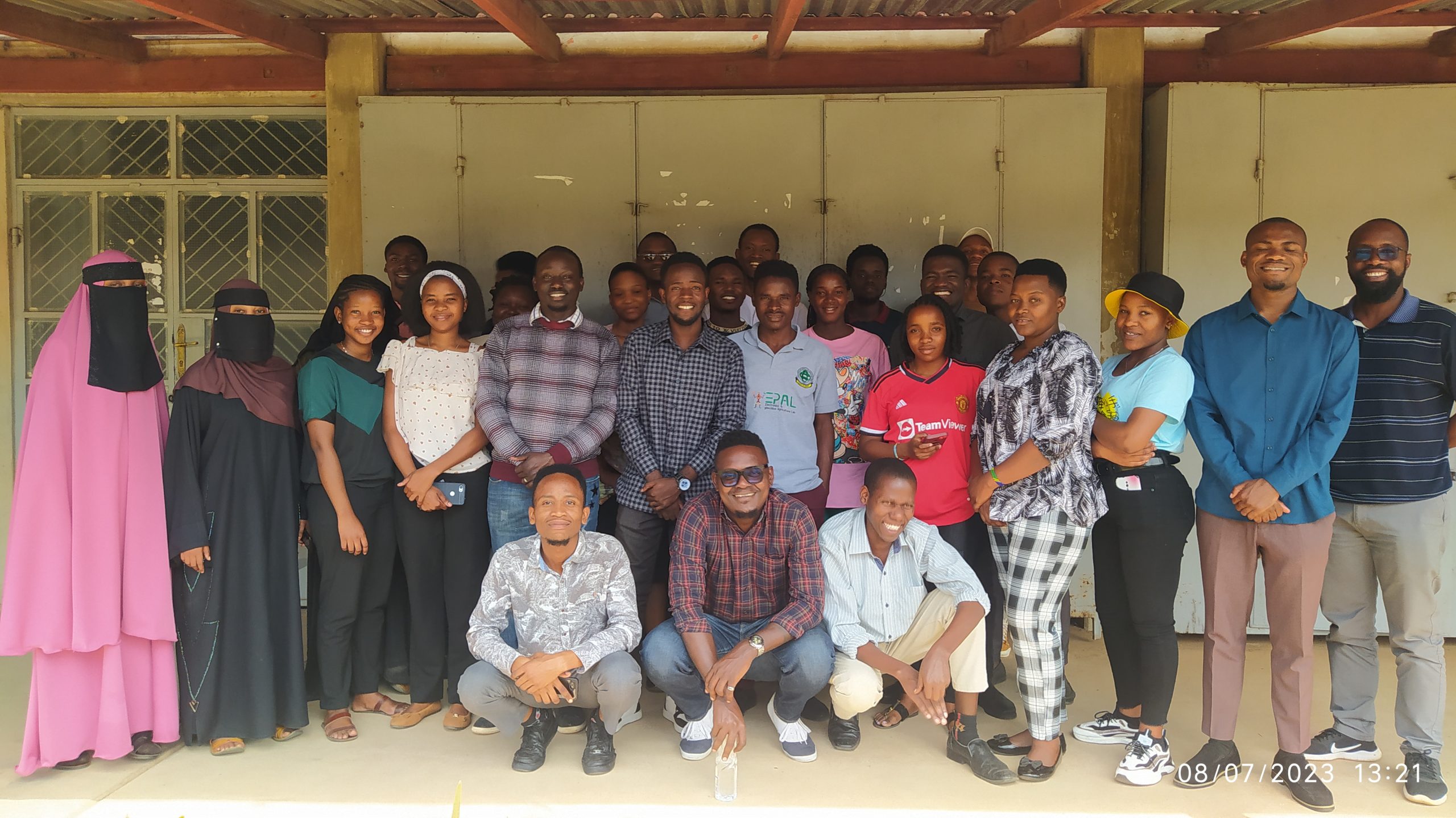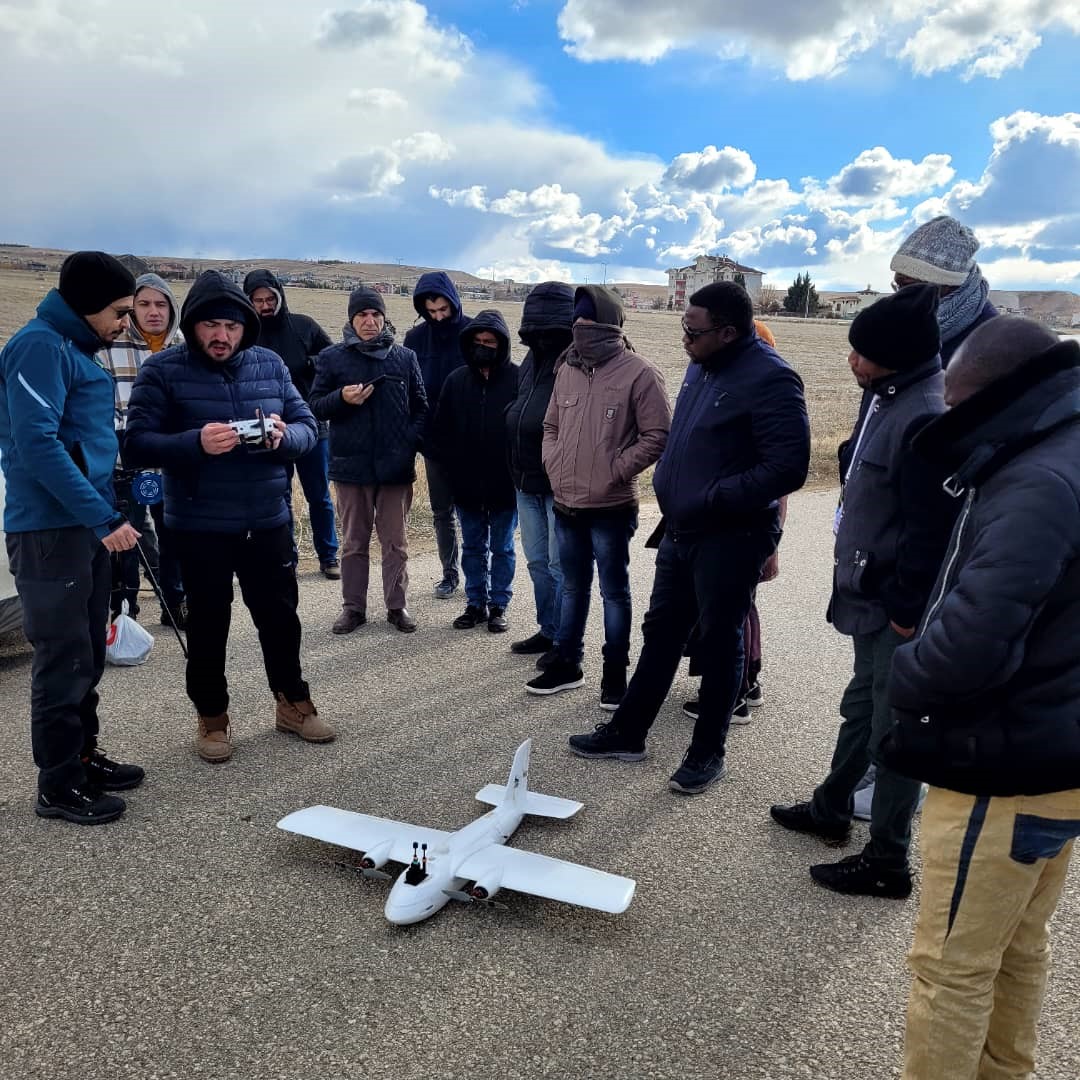YEESI LAB held a training workshop on how to build startup companies and the key features that enable their survival on Saturday, July 8, 2023, at the Solomon Malangu campus. Mr. Albany James, a Product Development Director for Anzisha Ventures and a successful serial entrepreneur, led the workshop.

Following the training workshop, students from both the Edward Moringe and Solomon Malangu campuses shared the following insights:
Thuwaiba Abdul-razak
I would like to extend my heartfelt appreciation for the training workshop organized by YEESI on Saturday. The session proved to be an invaluable source of knowledge, enlightening me on the contrasting impacts of excessive capital and the absence thereof. It was through this experience that I acquired a profound understanding of the inherent challenges posed by an abundance of capital, as well as the unique obstacles faced when one lacks sufficient capital.
Jackline Ulenje
I, Jackline Ulenje, a dedicated third-year student pursuing a degree in Irrigation and Water Resources Engineering, am delighted to express my profound appreciation for the Saturday workshop that I had the privilege of attending. The workshop proved to be an invaluable opportunity, allowing me to enhance my understanding of the intricate process of selecting an ideal business partner and effectively harnessing individual talents when establishing a company. I am elated to convey that the workshop provided me with valuable insights and knowledge in making informed decisions regarding partnership selection. One crucial lesson I gleaned from the session was the recognition that while friendship is undoubtedly important, it should not be the sole determining factor when choosing a suitable company partner. This newfound understanding has significantly broadened my perspective and equipped me with a more nuanced approach to forming successful and sustainable business alliances. As an aspiring professional in the field of Irrigation and Water Resources Engineering, this workshop has played an instrumental role in shaping my future endeavours. The invaluable guidance received on effectively leveraging individual talents within a partnership will undoubtedly contribute to my ability to establish and nurture successful business ventures. I extend my sincere gratitude to the organizers of the workshop for their meticulous planning and execution, which provided me with a remarkable learning experience. The knowledge and skills acquired during the session will undoubtedly serve as a solid foundation for my academic and professional growth.
Ibrahim Meshack
I extend my heartfelt congratulations to your esteemed lab for orchestrating an exceptional training session this past Saturday. As Ibrahim Meshack, a dedicated second-year student pursuing a degree in Agriculture Engineering, I am delighted to express my gratitude for the invaluable knowledge I gained regarding securing initial capital for a startup. The workshop underscored the significance of effectively pitching our ideas in pitching competitions. The training session provided me with invaluable insights and practical guidance on the crucial aspect of securing the first capital required to initiate a startup venture. I now possess a deeper understanding of the strategies and approaches necessary to attract potential investors and secure the financial backing essential for transforming entrepreneurial aspirations into reality. The emphasis placed on pitching competitions as a valuable avenue for showcasing innovative ideas has inspired me to hone my communication and presentation skills, empowering me to effectively convey the value proposition of my future endeavors.
Gervas
The lack of guidance regarding the initial steps and necessary actions to build a startup company can be likened to a blind person unknowingly moving towards a pit. My name is Gervas, and I am currently a third-year student pursuing a degree in Agriculture Engineering. During my educational journey, I have gained valuable insights into the essential aspects of registering a company. It has become evident that when embarking on the process of registering a company, three primary institutions should be prioritized: BRELA, TRA, and a bank. These entities hold critical roles in ensuring a smooth and compliant registration process for a new business venture. Understanding the significance of engaging with BRELA, TRA, and a bank has equipped me with valuable knowledge that will guide me in laying a solid foundation for my future entrepreneurial pursuits.
Stephano Mashauri
It has come to my attention that “Sheli” is not a Swahili term for a filling station. I am Stephano Mashauri, a dedicated second-year student of Agriculture. Through the enlightening Saturday workshop I recently attended, I acquired valuable insights into various aspects of entrepreneurship, including the art of creating compelling company names like “Sheli,” effective investor management strategies, and diverse sources of income for startup ventures. During the workshop, I gained a deeper understanding of the significance of crafting impactful company names that resonate with target audiences. The session provided me with valuable techniques and principles to consider when developing compelling and memorable brand identities, such as “Sheli.” This knowledge will undoubtedly prove invaluable as I embark on my own entrepreneurial journey. Furthermore, the workshop shed light on the critical role of investor management in the success of startup companies. I gained valuable insights into the effective communication strategies and relationship-building techniques necessary for attracting and retaining investors. Understanding how to nurture these vital relationships will play a pivotal role in securing the necessary financial support for future ventures. Additionally, the workshop highlighted the importance of diversifying income sources for startup enterprises. I learned about various avenues through which startups can generate revenue, thereby reducing dependence on a single income stream. This knowledge will enable me to explore innovative and sustainable ways to ensure the financial stability and growth of my future ventures.
Pascal Kamsini
My name is Pascal Kamsini, and I am currently a third-year student pursuing a Bachelor’s degree in Bioprocessing Engineering. I am pleased to share that the recent Saturday workshop has provided me with valuable insight: every problem encountered presents an opportunity, albeit with the crucial distinction that the problem should be approached from a communal perspective rather than a personal one. Through the workshop, I gained a deeper understanding of the transformative power that lies within challenges. I learned to recognize that each problem is not only a hurdle to overcome but also an opening for growth and development. However, it was emphasized that for these opportunities to be fully realized, the focus should be on communal challenges—issues that affect a larger group or community—rather than solely personal ones. This perspective shift has significantly influenced my understanding of problem-solving and innovation. I now recognize the importance of considering the broader context and impact of the challenges we face. By addressing communal problems, we have the potential to make a more significant and lasting difference, creating positive change that extends beyond our individual circumstances.
Adam Jamal
I am Adam Jamal, currently pursuing a Bachelor’s degree in Irrigation and Water Resources Engineering. The Saturday workshop I attended proved to be an enlightening experience, as it provided valuable insights into three distinct pathways for building startup companies through investor involvement: pitching, competitions, and incubation. During the workshop, I gained a deeper understanding of the pivotal role investors play in the growth and success of startups. The session emphasized three effective approaches to attracting investor support and securing the necessary resources for entrepreneurial ventures. The first approach highlighted the significance of pitching, which involves presenting a compelling business proposal to potential investors. I learned about the key elements of an effective pitch, including clear communication of the value proposition, market potential, and financial projections. This knowledge will undoubtedly be invaluable as I seek to secure investor backing for future startup endeavours. The second avenue explored in the workshop was participation in competitions. These events provide entrepreneurs with a platform to showcase their innovative ideas and gain exposure to potential investors. I gained insights into the strategies and techniques necessary to craft a winning competition entry, including capturing the attention of judges, clearly articulating the problem-solving aspect of the business, and demonstrating market viability. Lastly, the workshop discussed the concept of incubation, which involves partnering with established programs or organizations that provide support, mentorship, and resources to startups. This approach allows entrepreneurs to benefit from expert guidance, networking opportunities, and access to investors within the incubation ecosystem. I learned about the advantages of incubation and the criteria to consider when selecting the right program for a specific startup.
Nsonga Barnabas
The workshop I attended provided me with valuable knowledge regarding two essential aspects of business sustainability: understanding the concept of burning cost per month and recognizing the significance of intermediate capital. Firstly, I learned about the concept of burning cost per month, which refers to the amount of capital a business requires to cover its operating expenses on a monthly basis. This crucial metric allows entrepreneurs to accurately assess their financial needs and plan accordingly. By understanding their burning cost per month, businesses can make informed decisions regarding budgeting, investment, and cash flow management, ensuring their operations remain sustainable. Secondly, the workshop shed light on the importance of having intermediate capital. This refers to the availability of funds or resources that can sustain a business during periods of unexpected challenges, fluctuations in revenue, or unforeseen expenses. Intermediate capital serves as a financial buffer, providing stability and allowing businesses to weather temporary setbacks without compromising their operations or long-term viability. Understanding the significance of intermediate capital enables entrepreneurs to proactively plan and secure resources to mitigate potential risks and ensure business continuity. It emphasizes the importance of strategic financial management and highlights the need to build resilience and adaptability into the core of a startup or business venture.
Shimbi
As a diligent student pursuing a degree in Agriculture Engineering, I am delighted to express my profound appreciation for the Saturday workshop organized by YEESI LAB. This enlightening session proved to be immensely beneficial, particularly in the realm of problem-solving. The workshop emphasized a crucial principle: rather than investing excessive efforts in creating new solutions, we should prioritize technology transfer by leveraging existing ones already in production. The workshop’s emphasis on this approach to problem-solving resonated deeply with me. It underscored the importance of efficiency and resource optimization in addressing challenges within the field of agriculture engineering. By leveraging existing technologies and solutions that have already been developed and proven effective, we can save time, effort, and resources while still achieving desired outcomes. The workshop has broadened my perspective and provided me with valuable insights into the principles of technology transfer and its significance in problem-solving. This newfound understanding will undoubtedly influence my future endeavours within the agricultural engineering domain, guiding me towards more efficient and sustainable approaches to addressing challenges.




